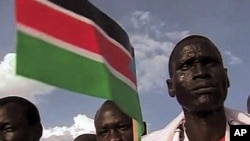A prominent member of Sudan’s opposition Popular Congress Party (PCP) has denied accusations that supporters of the party within the President Omar Hassan Al-Bashir led-unity government want to undermine the 9th January referendum.
General Mohammed Khalifa, PCP’s Secretary for Security and Defense said his party is “strongly” opposed to external forces, who in his words want to divide Sudan mainly to gain access or “to loot” the country’s rich natural resources including oil.
“We want the referendum to be free and fair and not influenced by insiders or outsiders. We want really the southerners to choose freely without any (influence so) we will respect the results. But, if it is not free and fair that means if it is interfered with by the government of the south or by the government of the north or by outsiders, I think it will not be free and fair.”
General Khalifa added that any interference will not reflect what he described as the “real hopes and real wishes of the people of the south.”
Local media quoted Andrew Natsios, a former U.S special envoy to Sudan, as saying partisans loyal to opposition leader Hassan Al-Turabi are seeking to derail the upcoming referendum in order to avert what appears to be a possible secession of the semi-autonomous south Sudan.
“If the Sudanese government stops stonewalling .... They (ruling party officials) are trying to use the referendum as a weapon. The north wants to get a higher use of oil, they want a deal on Nile River and debt level.”
General Khalifa said there are indications President Bashir’s National Congress Party seems not to be interested in a possible south secession.
“They don’t want that to happen because they think if there is a referendum the south will secede. They (southerners) will like to be independent, and they don’t want that to happen at all. Because if it happens, the majority of the (people in the) north will be angry and they (NCP) will lose the power. For that reason, they don’t want it to happen.”
He also said his party supports a referendum that is conducted in a free and fair environment without what he described as internal or external interference.





